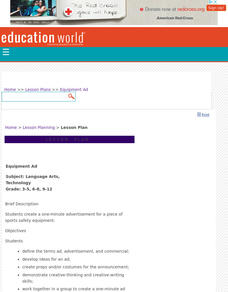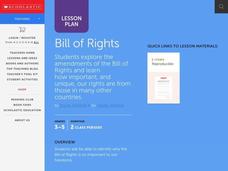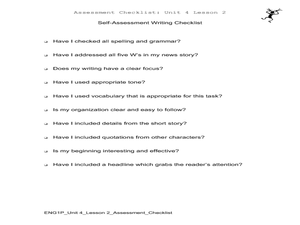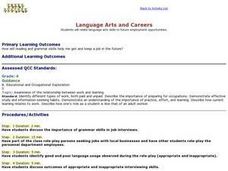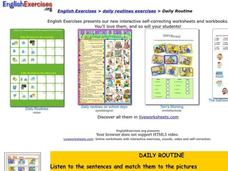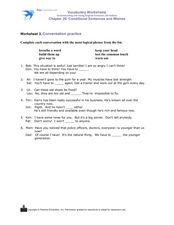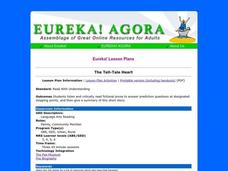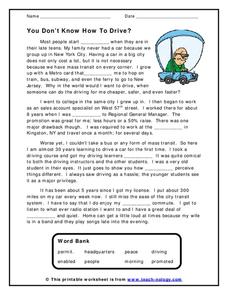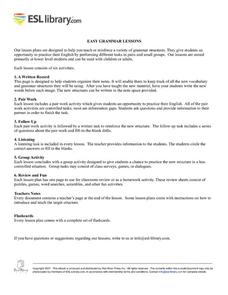Curated OER
Modals
Verbs can be tricky, especially those modal verbs of probability. Take a look at a wonderful 16-page workbook that uses think-pair-share, critical thinking, skills practice, and discussion to assist learners in using the correct modal...
ReadWriteThink
Literature Circles: Getting Started
Make reading more enjoyable and interactive with literature circles! Here you'll find detailed lessons to begin the literature circle process. Ten lessons introduce each role learners take on. Literature circle roles include...
Curated OER
Reasons for Settling the New World
After studying the reasons settlers entered the New World, primary learners try to persuade others to enter this new land. Class members present their arguments in a variety of ways including posters, writings, and charts. Richly...
Curated OER
Equipment Ad
Students create a one-minute advertisement for a piece of sports safety equipment. They define the terms ad, advertisement, and commercial and demonstrate creative-thinking and creative-writing skills.
Curated OER
Bill of Rights
Young scholars discuss the government as a whole and then each amendment is examined. They complete a Bill of Rights test in groups or on their own. Answers are gone over in class and discussion is encouraged.
Curated OER
Martin Luther King Jr. and Nonviolence
Using the book, Martin's Big Words, learners will discover the life of Dr. Martin Luther King Jr. Vocabulary is identified throughout the story by using several his famous protest speeches as examples. Class discussions on racism, during...
Curated OER
Who Am I?
Your budding journalists need to understand the five W's for writing a news story. They read a story, complete several graphic organizers to help them organize and write their article, and then use a self-assessment learning exercise to...
Curated OER
Out of the Dust: Narrative Essay
To conclude their study of Out of the Dust, the 1998 Newbery Medal winning verse novel, individuals craft a narrative essay based on one of the themes in Karen Hesse's novel.
Curated OER
Language Arts and Careers
Fourth graders discuss the importance of grammar skills in job interviews. They role-play employers and prospective employees in a mock job interview. They discuss good and bad grammar that was used and outcomes that could come from...
Curated OER
Daily Routine
In this daily routine worksheet, students listen to sentences and match them to pictures, sequence sentences, and solve a crossword. Students complete 3 activities about a daily routine.
Curated OER
Written Conversation
In this recognizing meanings of phrases worksheet, students use context clues and the word bank to complete conversation sentences. Students fill in 6 blanks.
Curated OER
The Tell-Tale Heart
Readers listen and critically read fictional prose to answer prediction questions at designated stopping points, and then they give a summary of the short story. This lesson is ideal for English language learners developing English...
Curated OER
Flat Stanley Travels to U.S. Regions
Fourth Graders read the book Flat Stanley by Jeff Brown. In the story a bulletin board flattens the main character. He is then sent in an envelope to a friend in California. During a fantasy genre language arts unit, groups of students...
Curated OER
Apple Adjectives
Study different apple varieties and use appropriate adjectives to describe them. Learners alphabetize both the apple names and the adjectives before creating spreadsheet, bar, and pie graphs. A mix of language arts, technology, and...
Curated OER
Dictionary Skills
An online, interactive worksheet provides plenty of practice with using the dictionary. Learners look up and complete or correct 22 compound nouns and adjectives. They connect definitions of words that have affixes to the definitions of...
Teach-nology
You Don’t Know How to Drive?
A cloze reading passage about getting a driver's permit at an older age prompts kids to use context clues as they read. They can use the word bank below to fill in eight blank spaces throughout the story.
Curated OER
Revising Writing: Plain English
Eschew obfuscation! Using dictionaries, writers revise a complicated text so that it reads more simply and improves the clarity of the passage. Focusing on word meanings, they revise the sample worksheets and then present their...
Curated OER
Usage Errors
Look at the most commonly confused words in the English language! This resource briefly explains the difference between there, they're, and their as well as too, to, and two, and finally it's and its. First, read the section...
University Interscholastic League
English Lesson to Prepare for UIL Spelling and Vocabulary Contest
"i before e. . ." Spelling is easier if kids know the eight basic spelling rules contained in this resource packet.
EngageNY
Learning About Farms in Colonial America: Explicit vs. Inferred Information
Aid your pupils in understanding the terms explicit and inferred while teaching them about colonial farmers. The third activity in the module builds off the previous activity and focuses heavily on inference. Learners analyze a...
Curated OER
ESL Grammar Lessons
Practice makes perfect when it comes to learning grammar with this ESL resource. Offering a great way to teach about relative clauses, this lesson engages students with a series of partner, small group, and whole class speaking and...
Curated OER
The Art of Protesting
Students view various images to examine different types of protest Americans have used throughout history, and explore ways in which protest can produce change for better or worse.
Novelinks
Maniac Magee: Discussion Questions
Why did they say that? What did they mean? How did they feel? Using the six levels of Bloom's Taxonomy, challenge your young readers to answer the comprehension questions about chapters 41 and 42 of Maniac Magee by Jerry Spinelli. Each...
Estrella Mountain Community College
Active and Passive Voice
Adult language learners will benefit from this 20-slide presentation about active and passive voice constructions. Learners craft active and passive voice questions in the simple present and simple past tenses.



